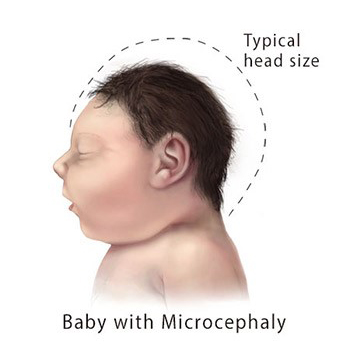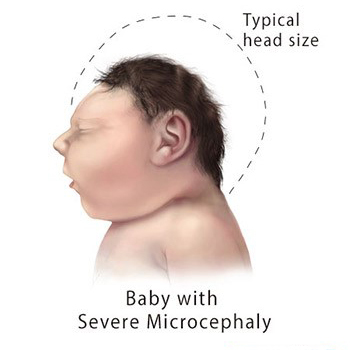Microcephaly
Microcephaly is a birth defect in which a baby’s head size is smaller than expected when compared to other babies of the same age and sex. In severe microcephaly, a baby’s head is much smaller when compared to other babies of the same age and sex. In babies with microcephaly, often the brain has not developed properly.



Photo Credit: Centers for Disease Control and Prevention, National Center on Birth Defects and Developmental Disabilites
Causes and Risk Factors
Most of the time, the cause of microcephaly is unknown. Sometimes, certain exposures during pregnancy can cause microcephaly, including:
- Certain infections, such as Zika virus, rubella, toxoplasmosis or cytomegalovirus
- Severe malnutrition, meaning a lack of nutrients or not getting enough food
- Exposure to harmful substances such as alcohol, certain drugs or toxic chemicals
- Interruption of the blood supply to the baby’s brain during development
Diagnosis
Sometimes, a health care provider can diagnose microcephaly during pregnancy with an ultrasound test. To diagnose microcephaly after birth, a health care provider will measure the distance around the baby’s head. They will compare the measurement to standards for babies of the same sex and age.
Possible Problems
It is difficult to predict what problems microcephaly can cause. Some babies with mild microcephaly have no problems apart from small head size. However, if a baby's microcephaly is related to poor brain development during pregnancy or other birth defects, there may be medical problems. A baby with microcephaly may have:
- Seizures
- Problems with sitting, standing, walking or speaking
- Learning or intellectual disabilities (reduced ability to learn and function in daily life)
- Problems with movement and balance
- Feeding problems, such as difficulty swallowing
- Hearing loss
- Vision problems
These issues can be mild or serious. Babies with severe microcephaly may get more complications, or struggle more with them, than babies with milder microcephaly. Rarely, severe microcephaly can be fatal.
Caring for a Child with Microcephaly
There is no cure or standard treatment for microcephaly. Babies with microcephaly need regular check-ups with a health care provider to monitor their development and to manage any health complications.
Babies with microcephaly qualify for the New York City Early Intervention Program. This program provides evaluations, therapy (such as physical, occupational and speech therapy, and special instruction) and support services to families with children who have disabilities or developmental delays. The program is available at no out-of-pocket cost, regardless of race, ethnicity, income or immigration status.




